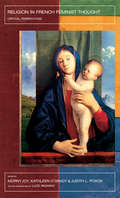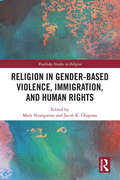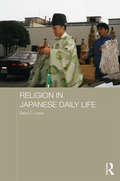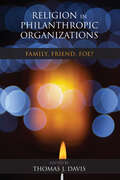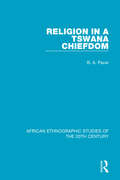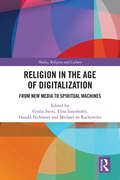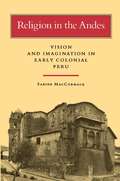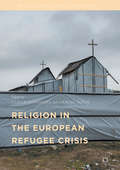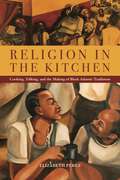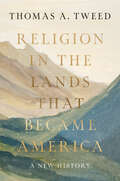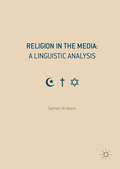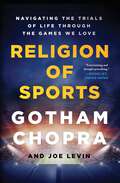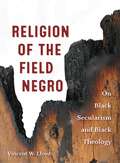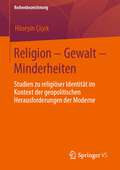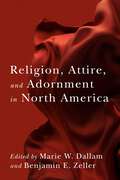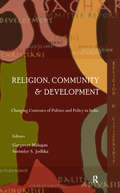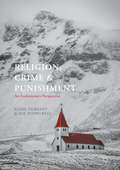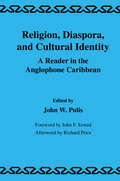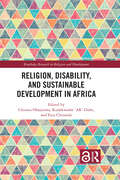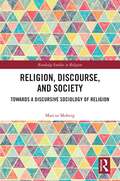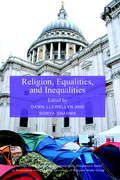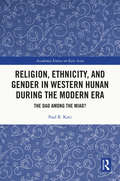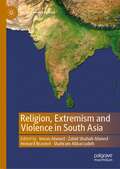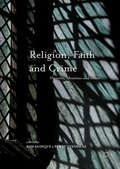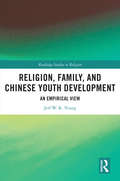- Table View
- List View
Religion in French Feminist Thought: Critical Perspectives
by Morny Joy Kathleen O’Grady Judith L. PoxonReligion in French Feminist Thought: Critical Perspectives brings together some of the leading modern religious responses to major French feminist writings on religion. It considers central figures such as Hélène Cixous, Julia Kristeva, Luce Irigaray and Catherine Clément, and its focus on questions of divinity, subjectivity, and ethics provides an accessible introduction to an area of growing philosophical interest.Illustrating the ways in which French feminism has become a valuable tool in feminist efforts to rethink religion, and responding to its promise as an intellectual resource for religious philosophy in the future, Religion in French Feminist Thought is ideal both for independent use and as a companion book to French Feminists on Religion (Routledge, 2001).
Religion in Gender-Based Violence, Immigration, and Human Rights (Routledge Studies in Religion)
by Jacob K. Olupona Mary NyangwesoThis book builds on work that examines the interactions between immigration and gender-based violence, to explore how both the justification and condemnation of violence in the name of religion further complicates our societal relationships. Violence has been described as a universal challenge that is rooted in the social formation process. As humans seek to exert power on the other, conflict occurs. Gender based violence, immigration, and religious values have often intersected where patriarchy-based power is exerted on the other. An international panel of contributors take a multidisciplinary approach to investigating three central themes. Firstly, the intersection between religion, immigration, domestic violence, and human rights. Secondly, the possibility of collaboration between various social units for the protection of immigrants’ human rights. Finally, the need to integrate faith-based initiatives and religious leaders into efforts to transform attitude formation and general social behavior. This is a wide-ranging and multi-layered examination of the role of religion in gender-based violence and immigration. As such, it will be of keen interest to academics working in religious studies, gender studies, politics, and ethics.
Religion in Japanese Daily Life (Japan Anthropology Workshop Series)
by David C. LewisAre Japanese people religious – and, if so, in what ways? David Lewis addresses this question from the perspective of ordinary Japanese people in the context of their life cycles, and explores why they engage in religious activities. He not only discusses how Japanese people engage in different religious practices as they encounter new events in their lives but also analyses the attitudes and motivations behind their behaviour. Activities such as fortune-telling, religious rites in the workplace, ancestral rites and visits to shrines and temples are actually engaged in by many people who view themselves as ‘non- religious’ but express their motivations in terms other than the conventional ‘religious’ ones. This book outlines the religious options available, and assesses why people choose particular religious activities at various times in their lives or in specific circumstances. The author challenges some widespread assumptions about religion in urban and industrial contexts and also shows how some of the underlying motivations behind Japanese behaviour are expressed both in religious and non-religious forms.
Religion in Philanthropic Organizations: Family, Friend, Foe?
by Thomas J. DavisReligion in Philanthropic Organizations explores the tensions inherent in religious philanthropies across a variety of organizations and examines the effect assumptions about "professional" philanthropy have had on how religious philanthropies carry out their activities. Among the organizations discussed are the Salvation Army, the World Council of Churches, and Catholic Charities USA. The essays focus on the work of one individual, Robert Pierce, founder of World Vision and Samaritan's Purse, and on more general matters such as philanthropy and Jewish identity, American Muslim philanthropy since 9/11, and the federal program that funds faith-based initiatives. The book sheds light on how religion and philanthropy function in American society, shaping and being shaped by the culture and its notions of the "common good."
Religion in a Tswana Chiefdom
by B. A. PauwOriginally published in 1960, this book is a study of religion among the Tlhaping, a rural Bantu society who were the first among the Tswana tribes to come into contact with Europeans. The religious organization of the Tlhaping has been viewed within the framework of the people’s social structure and economy. The book traces the declining influence of paganism before surveying the types of churches, their organization, activities, rituals and revelations, with particular reference to Bantu separatist churches.
Religion in the Age of Digitalization: From New Media to Spiritual Machines (Routledge Research in Religion, Media and Culture)
by Giulia Isetti; Elisa Innerhofer; Harald Pechlaner; Michael de RachewiltzThis book examines the current use of digital media in religious engagement and how new media can influence and alter faith and spirituality. As technologies are introduced and improved, they continue to raise pressing questions about the impact, both positive and negative, that they have on the lives of those that use them. The book also deals with some of the more futuristic and speculative topics related to transhumanism and digitalization. Including an international group of contributors from a variety of disciplines, chapters address the intersection of religion and digital media from multiple perspectives. Divided into two sections, the chapters included in the first section of the book present case studies from five major religions: Christianity, Islam, Buddhism, Hinduism and Judaism and their engagement with digitalization. The second section of the volume explores the moral, ideological but also ontological implications of our increasingly digital lives. This book provides a uniquely comprehensive overview of the development of religion and spirituality in the digital age. As such, it will be of keen interest to scholars of Digital Religion, Religion and Media, Religion and Sociology, as well as Religious Studies and New Media more generally, but also for every student interested in the future of religion and spirituality in a completely digitalized world.
Religion in the Andes: Vision and Imagination in Early Colonial Peru
by Sabine MacCormackAddressing problems of objectivity and authenticity, Sabine MacCormack reconstructs how Andean religion was understood by the Spanish in light of seventeenth-century European theological and philosophical movements, and by Andean writers trying to find in it antecedents to their new Christian faith.
Religion in the European Refugee Crisis (Religion and Global Migrations)
by Graeme Smith Ulrich SchmiedelThis book explores the roles of religion in the current refugee crisis of Europe. Combining sociological, philosophical, and theological accounts of this crisis, renowned scholars from across Europe examine how religion has been employed to call either for eliminating or for enforcing the walls around “Fortress Europe.” Religion, they argue, is radically ambiguous, simultaneously causing social conflict and social cohesion in times of turmoil. Charting the constellations, the conflicts, and the consequences of the current refugee crisis, this book thus answers the need for succinct but sustained accounts of the intersections of religion and migration.
Religion in the Kitchen: Cooking, Talking, and the Making of Black Atlantic Traditions (North American Religions)
by Elizabeth PérezHonorable Mention, 2019 Barbara T. Christian Literary Award, given by the Caribbean Studies AssociationWinner, 2017 Clifford Geertz Prize in the Anthropology of Religion, presented by the Society for the Anthropology of Religion section of the American Anthropological AssociationFinalist, 2017 Albert J. Raboteau Prize for the Best Book in Africana Religions presented by the Journal of Africana ReligionsAn examination of the religious importance of food among Caribbean and Latin American communitiesBefore honey can be offered to the Afro-Cuban deity Ochún, it must be tasted, to prove to her that it is good. In African-inspired religions throughout the Caribbean, Latin America, and the United States, such gestures instill the attitudes that turn participants into practitioners. Acquiring deep knowledge of the diets of the gods and ancestors constructs adherents’ identities; to learn to fix the gods’ favorite dishes is to be “seasoned” into their service.In this innovative work, Elizabeth Pérez reveals how seemingly trivial "micropractices" such as the preparation of sacred foods, are complex rituals in their own right. Drawing on years of ethnographic research in Chicago among practitioners of Lucumí, the transnational tradition popularly known as Santería, Pérez focuses on the behind-the-scenes work of the primarily women and gay men responsible for feeding the gods. She reveals how cooking and talking around the kitchen table have played vital socializing roles in Black Atlantic religions.Entering the world of divine desires and the varied flavors that speak to them, this volume takes a fresh approach to the anthropology of religion. Its richly textured portrait of a predominantly African-American Lucumí community reconceptualizes race, gender, sexuality, and affect in the formation of religious identity, proposing that every religion coalesces and sustains itself through its own secret recipe of micropractices.
Religion in the Lands That Became America: A New History
by Thomas A. TweedA sweeping retelling of American religious history, showing how religion has enhanced and hindered human flourishing from the Ice Age to the Information Age Until now, the standard narrative of American religious history has begun with English settlers in Jamestown or Plymouth and remained predominantly Protestant and Atlantic. Driven by his strong sense of the historical and moral shortcomings of the usual story, Thomas A. Tweed offers a very different narrative in this ambitious new history. He begins the story much earlier—11,000 years ago—at a rock shelter in present-day Texas and follows Indigenous Peoples, African Americans, transnational migrants, and people of many faiths as they transform the landscape and confront the big lifeway transitions, from foraging to farming and from factories to fiber optics. Setting aside the familiar narrative themes, he highlights sustainability, showing how religion both promoted and inhibited individual, communal, and environmental flourishing during three sustainability crises: the medieval Cornfield Crisis, which destabilized Indigenous ceremonial centers; the Colonial Crisis, which began with the displacement of Indigenous Peoples and the enslavement of Africans; and the Industrial Crisis, which brought social inequity and environmental degradation. The unresolved Colonial and Industrial Crises continue to haunt the nation, Tweed suggests, but he recovers historical sources of hope as he retells the rich story of America&’s religious past.
Religion in the Media: A Linguistic Analysis
by Salman Al-AzamiThis ground-breaking book takes an interdisciplinary approach to language, religion and media using an audience-response study. In this book, the author investigates how the three Abrahamic faiths - Christianity, Judaism and Islam - are represented in mainstream British media and analyses how members of each religious group and those with no religion receive those representations. Employing Critical Discourse Analysis, Al-Azami considers the way the media use their power of language to influence the audience's perceptions of the three religions through newspaper articles, television documentaries and television dramas. Chapter 3 presents the results of an original investigation into the responses of members of the three religious groups and those with no religion when exposed to those same media materials. The author applies the encoding/decoding model and also considers people's views in face-to-face interactions compared to comments on online newspapers. Comprehensive in its analysis, this book will be of interest to students of Linguistics, Media Studies, Religious Studies, and Journalism.
Religion of Sports: Navigating the Trials of Life Through the Games We Love
by Gotham Chopra Joe LevinFrom the acclaimed director who has gone behind the scenes with many of the greatest athletes in the world, a memoir-meets-manifesto featuring never-before-heard stories about Tom Brady, Simone Biles, Kobe Bryant, Serena Williams, and many more. Sports is religion. No, really. From pilgrimages and cathedrals, gods and fallen angels, holy wars and holy ghosts, sports has every aspect of an organized faith. In fact, it might be even better: all it takes to believe is to stand and cheer. Nobody knows this better than the preeminent sports documentarian Gotham Chopra, who just so happens to be the son of world-renowned spiritualist Deepak Chopra. While his father taught him to find faith through prayer, Gotham felt pulled towards the Boston Garden and Larry Bird instead. Tracing his unique path from being a diehard fan to witnessing miracles alongside the gods of sport, Gotham makes a compelling case for sports as a modern-day faith. And like any worthy religious text, he also doles out wisdom, which comes in the form of never-before-heard stories about some of the biggest names in sports. Rarely has anyone had such an up-close view of greatness as Chopra, and now, he lets you come with him behind the scenes to learn how legendary quarterback Tom Brady managed the end of his career, gold medal gymnast Simone Biles struggled with the pressure of the Tokyo Olympics, Golden State Warriors sharpshooter Stephen Curry developed the greatest three-point shot of all time, and much more. Chopra weaves together stories from Kobe Bryant, Alex Morgan, LeBron James, Michael Strahan, Shaun White, and more into modern-day parables that unlock secrets of competition—and of life. Passionate and inspiring, the Religion of Sports is not just for diehard sports fans, but for anyone who&’s ever believed in something greater than themselves.
Religion of the Field Negro: On Black Secularism and Black Theology
by Vincent W. LloydBlack theology has lost its direction. To reclaim its original power and to advance racial justice struggles today black theology must fully embrace blackness and theology. But multiculturalism and religious pluralism have boxed in black theology, forcing it to speak in terms dictated by a power structure founded on white supremacy. In Religion of the Field Negro, Vincent W. Lloyd advances and develops black theology immodestly, privileging the perspective of African Americans and employing a distinctively theological analysis.As Lloyd argues, secularism is entangled with the disciplining impulses of modernity, with neoliberal economics, and with Western imperialism – but it also contaminates and castrates black theology. Inspired by critics of secularism in other fields, Religion of the Field Negro probes the subtle ways in which religion is excluded and managed in black culture. Using Barack Obama, Huey Newton, and Steve Biko as case studies, it shows how the criticism of secularism is the prerequisite of all criticism, and it shows how criticism and grassroots organizing must go hand in hand. But scholars of secularism too often ignore race, and scholars of race too often ignore secularism. Scholars of black theology too often ignore the theoretical insights of secular black studies scholars, and race theorists too often ignore the critical insights of religious thinkers. Religion of the Field Negro brings together vibrant scholarly conversations that have remained at a distance from each other until now. Weaving theological sources, critical theory, and cultural analysis, this book offers new answers to pressing questions about race and justice, love and hope, theorizing and organizing, and the role of whites in black struggle. The insights of James Cone are developed together with those of James Baldwin, Sylvia Wynter, and Achille Mbembe, all in the service of developing a political-theological vision that motivates us to challenge the racist paradigms of white supremacy.
Religion – Gewalt – Minderheiten: Studien zu religiöser Identität im Kontext der geopolitischen Herausforderungen der Moderne
by Hüseyin ÇiçekDer Band nimmt aus unterschiedlichen religionswissenschaftlichen und sozialwissenschaftlichen Perspektiven aktuelle Themen der Religionswissenschaft in den Blick. Sie gehen explizit oder implizit von der zentralen religionswissenschaftlichen sowie -politischen These aus, dass Solidarität im Inneren von Gemeinschaften durch Feindschaft nach Außen begünstigt wird. Diese simpel wirkende Formel hat viele Facetten und wird deshalb in den jeweiligen Artikeln mit dem spezifischen Fokus auf Religion, Gewalt/Terrorismus und Minderheiten aus unterschiedlichen Perspektiven analysiert, um sie sowohl komparativ als auch konnektiv auf den Prüfstand zu stellen.
Religion, Attire, and Adornment in North America
by Marie W. Dallam and Benjamin E. ZellerClothing, dress, and ornamentation are crucial parts of individual and communal religious life and practice, yet they are too often overlooked. This book convenes leading scholars to explore the roles of attire and adornment in the creation and communication of religious meaning, identity, and community. Contributors investigate aspects of religious dress in North America in the nineteenth, twentieth, and twenty-first centuries, considering adornment practices in a wide range of religious traditions and among individuals who straddle religious boundaries. The collection is organized around four frameworks for understanding the material culture of religion: theological interpretation, identity formation, negotiation of tradition, and activism.Religion, Attire, and Adornment in North America features essays on topics such as Black Israelites’ use of African fabrics, Christian religious tattoos, Wiccan ritual nudity, Amish “plain dress,” Mormon sacred garments, Hare Krishna robes, and the Church of Body Modification. Spanning the diversity of religious practice and expression, this book is suitable for a range of undergraduate courses and offers new insights for scholars in many disciplines.
Religion, Community and Development: Changing Contours of Politics and Policy in India (Religion and Citizenship)
by Gurpreet Mahajan Surinder S. JodhkaBy making religious community a relevant category for discussing development deficit, the Sachar Committee Report (that was submitted to the Prime Minister of India in 2007) initiated a new political discourse in India. While the liberal secular framework privileged the individual over the community and was more inclined to use the category of class rather than the identity of religion, the Sachar Committee differentiated citizens on the basis of their religious identity. Its conclusions reinforced the necessity of approaching issues of development through the optic of religious community. This volume focuses on this shift in public policy. The articles in this collection examine the nature and implications of this new approach to the Indian social reality. Taking a close look at the findings of the Sachar Committee Report (SCR) they highlight the challenges posed by inter-community comparisons. At another level the articles supplement the debate initiated by the SCR by constructing a profile of religious communities in India so as to factor in their concerns of development into the present discourse and to nuance and modify the simple indicators to which development is often reduced. As most religious communities are themselves engaged in development-related activities the volume also examines some of these initiatives in order to see what development connotes to the members themselves and what receives attention by the community. Students of social sciences and development studies as well as those dealing with issues of marginalization will find this collection an invaluable resource for understanding contemporary India and for undertaking further theoretical and empirical research.
Religion, Crime and Punishment
by Russil Durrant Zoe PoppelwellThis book provides a critical discussion of the way in which religion influences: criminal and antisocial behaviour, punishment and the law, intergroup conflict and peace-making, and the rehabilitation of offenders. The authors argue that in order to understand how religion is related to each of these domains it is essential to recognise the evolutionary origins of religion as well as how genetic and cultural evolutionary processes have shaped its essential characteristics. Durrant and Poppelwell posit that the capacity of religion to bind individuals into socially cohesive 'moral communities' can help us to understand its complex relationship with cooperation, crime, punishment, inter-group conflict and forgiveness. An original and innovative study, this book will be of special interest to criminologists and other social scientists interested in the role of religion in crime, punishment, intergroup conflict and law.
Religion, Diaspora and Cultural Identity: A Reader in the Anglophone Caribbean (Library Of Anthropology. Ser. #Vol. 14.)
by J.W. PulisAlthough the religions of the Caribbean have been a subject of popular media, there have been few ethnographic publications. This text is a much-needed and long overdue addition to Caribbean studies and the exploration of ideas, beliefs, and religious practices of Caribbean folk in diaspora and at home. Drawing upon ethnographic and historical research in a variety of contexts and settings, the contributors to this volume explore the relationship between religious and social life. Whether practiced at home or abroad, the contributors contend that the religions of Caribbean folk are dynamic and creative endeavors that have mediated the ongoing and open-ended relation between local and global, historical and contemporary change.
Religion, Disability, and Sustainable Development in Africa (Routledge Research in Religion and Development)
by Ezra Chitando Chioma Ohajunwa Kudakwashe ‘ak’ DubeThis book investigates the interplay between disability and religion in Africa, and what this means in the context of the Sustainable Development Goals.The importance of meeting the needs of people with disabilities is highlighted specifically in several Sustainable Development Goals, as well as being emphasised as a cross-cutting issue across all the goals. Over 1 billion people are estimated to be living with disabilities, and 80% of this population live in the Global South, many within Africa. This book argues that within this context, religion must be considered, as people with disabilities often turn to religion for solace in confronting the daily struggles and pains that they face. Drawing on multiple disciplinary lenses, this book reflects on how traditional/indigenous, Abrahamic, and other African minority religions and philosophies interact with disability, and how this relates to the Sustainable Development Goals. The book demonstrates how religions in Africa conceptualise, imagine, or re-imagine disability in the context of key themes such as gender, ecological justice, health, poverty, education, employment, entrepreneurship, and migration.Overall, the book invites researchers from across the social sciences to consider how African religious, theological, and philosophical ideas can help towards the inclusion of people with disabilities in the 2030 development agenda in Africa.
Religion, Discourse, and Society: Discourse Theory and Analysis for the Sociology of Religion (Routledge Studies in Religion)
by Marcus MobergThis book focuses on the utility and application of discourse theory and discourse analysis in the sociological study of religious change. It presents an outline of what a ‘discursive sociology of religion’ looks like and brings scholarly attention to the role of language and discourse as a significant component in contemporary processes of religious change. Marcus Moberg addresses the concept of discourse and its main meta-theoretical underpinnings and discusses the relationship between discourse and ‘religion’ in light of previous research. The chapters explore key notions such as secularism and public religion as well as the ideational and discursive impact of individualism and market society on the contemporary Western religious field. In addition to providing scholars with a thorough understanding and appreciation of the analytic utility of discourse theory and analysis in the sociological study of religious change, the book offers a cohesive and systematized framework for actual empirical analysis.
Religion, Equalities, and Inequalities (Theology and Religion in Interdisciplinary Perspective Series in Association with the BSA Sociology of Religion Study Group)
by Sonya Sharma Dawn LlewellynPresenting cutting edge research on how religion can confront and obscure social inequalities in everyday life, Religion, Equalities and Inequalities argues that when religion is left out of social scientific analyses, it can result in incomplete analyses that conceal pathways to social inclusion and exclusion. Bringing together an international and interdisciplinary group of contributors who operate at the vanguard of theoretical and empirical work on how social structures of power, institutions and bodies can generate equalities and inequalities in religion, the collection shows how religion can enable and challenge the inequities that affect people’s everyday lives. Academics and students of religious studies, sociology, politics and social policy will all find this book offers useful insights into the relationship between religion and contemporary culture.
Religion, Ethnicity, and Gender in Western Hunan during the Modern Era: The Dao among the Miao? (Academia Sinica on East Asia)
by Paul R. KatzThis book explores how beliefs and practices have shaped the interactions between different ethnic groups in Western Hunan, as well as considering how religious life has adapted to the challenges of modern Chinese history. Combining historical and ethnographic methodologies, chapters in this book are structured around changes that occurred during the interaction between Miao ritual traditions and religions such as Daoism, with particular focus on the commonalities and differences seen between Western Hunan and other areas of Southwest China. In addition, investigation is made into how gender and ethnicity have shaped such processes, and what these phenomena can teach about larger questions of modern Chinese history. As such, this study transcends existing scholarship on Western Hunan – which has stressed the impact of state policies and elite agendas – by focusing instead on the roles played by ritual specialists. Such findings call into question conventional wisdom about the ‘standardization’ of Chinese culture, as well as the integration of local society into the state by means of written texts. Religion, Ethnicity, and Gender in Western Hunan during the Modern Era will prove valuable to students and scholars of history, ethnography, anthropology, ethnic studies, and Asian studies more broadly.
Religion, Extremism and Violence in South Asia (Politics of South Asia)
by Imran Ahmed Shahram Akbarzadeh Howard Brasted Zahid Shahab AhmedThis book sheds light on religiously motivated extremism and violence in South Asia, a phenomenon which ostensibly poses critical and unique challenges to the peace, security and governance not only of the region, but also of the world at large. The book is distinctive in-so-far as it reexamines conventional wisdom held about religious extremism in South Asia and departs from the literature which centres its analyses on Islamic militancy based on the questions and assumptions of the West’s ‘war on terror’. This volume also offers a comprehensive analysis of new extremist movements and how their emergence and success places existing theoretical frameworks in the study of religious extremism into question. It further examines topical issues including the study of social media and its impact on the evolution and operation of violent extremism. The book also analyses grassroots and innovative non-state initiatives aimed to counter extremist ideologies. Through case studies focusing on Bangladesh, India, Pakistan and Sri Lanka, this collection examines extremist materials, methods of political mobilisation and recruitment processes and maps the interconnected nature of sociological change with the ideological transformations of extremist movements.
Religion, Faith and Crime
by Kim Sadique Perry StanislasThis unique collection brings together international contributors from a range of disciplines to explore crime and responses to crime through a religious/faith-based lens. At a time when religion is under the media spotlight in terms of religiously-motivated hate crime, terrorism and child abuse this book provides an important platform for academic debate. It examines these and other key issues including: faith as a coping strategy, religion as a motivating factor and the role of religion and morality in shaping criminal justice responses. This collection clearly places religion/faith at the heart of criminological enquiry and illustrates its relevance in addressing wider social issues and would be of benefit to students and academics researching or studying in these areas. It will also be of interest to community and criminal justice practitioners and those with an interest in community engagement and multi-faith work.
Religion, Family, and Chinese Youth Development: An Empirical View (Routledge Studies in Religion)
by Jerf W. YeungReligion is a fundamental cultural factor profoundly influential on human mental health and behavioural choices, and, in addition, family is the most proximal and intimate socialization agent contributive to youth development. Religion, Family, and Chinese Youth Development explores how religious involvement of Chinese parents affects their psychological health and family socialization, which leads to various aspects of the development of Chinese youths. Specifically, a structural relationship between religion, family socialization, and youth development was constructed theoretically and tested empirically in the Chinese context, which can portray the linked lives of religious involvement of Chinese parents, parental psychological health, family processes, parenting practices, the development of psychosocial maturity, and the internalizing and externalizing outcomes of Chinese youths. Undeniably, the findings of this book provide insightful social and policy implications for researchers and human service practitioners related to Chinese societies. By clearly depicting and empirically testing the connections between religion, family, and Chinese youth development, the book can be a reference for clergy, family practitioners, researchers, policy makers, management of NGOs, and graduate students of social sciences.
